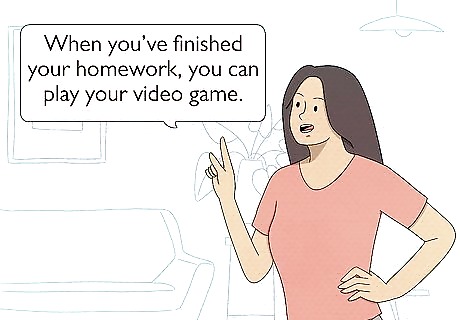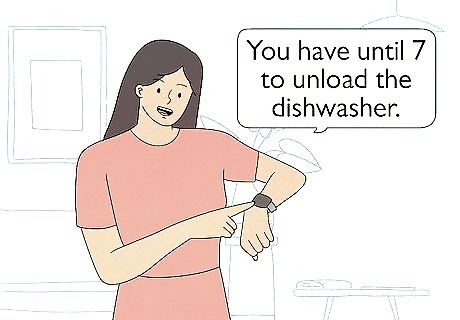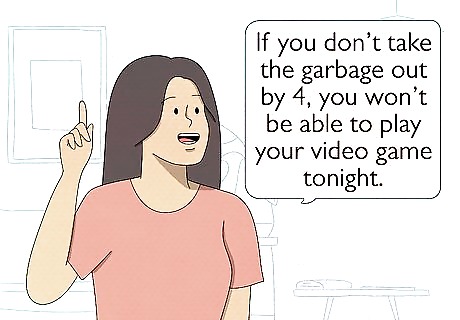
views
Motivating a Child to Do Schoolwork

Offer rewards and privileges for completing homework. Teach your child that they have to complete their work before they can do more enjoyable activities. Try to be consistent, and keep tabs on their access to a cell phone, video games, and other distractions. For example, say, “When you’ve finished your homework, you can play your video game.” You could have them put their phone in a basket and only allow them to access it once they’ve finished an assignment. Some kids do better when they listen to music, so you might find it helpful to make an electronics exception for tunes that motivate your child.

Review your child’s work when they’ve finished. Check their math problems or essays to make sure they’ve actually finished their work. If their homework involved studying, have them explain the assigned chapter to see how well they understand the material. Try not to come off like you don’t trust them. Say something like, “I’m not trying to hover or make it seem like I don’t have faith in you. I just want to play on your team and help you do your best.” If you find they’re dishonest about what they’ve been assigned, ask their teacher to initial their assignment book.

Help them break overwhelming tasks into smaller parts. Kids and adults alike usually put off tasks that seem unapproachable. If your child has a big project due, help them figure out how to divide it into more manageable chunks. Write down each step on a calendar, and follow up with them daily to make sure they don’t put off steps until the last minute. If you’re a teacher, try to break up big projects by including step-by-step instructions and shorter time frames. Instead of just assigning a long paper, try assigning different deadlines for an outline, first draft, and final draft.

Praise them for small successes. Encouragement is a key part of motivation. Verbal praise, spontaneous rewards, and other forms of encouragement will let your child know that you’re proud of their effort. For example, you could say, “I noticed you’ve been working really hard, and you’ve sat down to do your homework as soon as you get home every day this week. How about I take you out for ice cream?” You could also figure out age-appropriate rewards, like getting them a toy or giving them money to see a movie with their friends.

Look into getting a tutor or extra help from the teacher. It’s tough for anyone to get motivated to do something they don’t understand. If you’re not sure how to explain a lesson more clearly on your own, ask their teacher if they can spend a little time with your child before or after school. You could also see if their school has a peer tutoring program. Contact your child's teacher to find out when they offer tutoring. If it’s in your budget, you could look into hiring a private tutor. If you can't afford a tutor, ask an older sibling, family member, or trusted friend who is strong in that subject to help your child.

Identify underlying causes. Problems at home, bullying, and a range of other issues can also underlie a lack of motivation. When gifted children aren’t challenged, they often become unmotivated. Likewise, undiagnosed learning disabilities are commonly mistaken for laziness. Every child is unique, so parents, teachers, and school counselors or psychologist should work together to resolve specific situations through testing, medication, or counseling. Have a direct conversation with your child. Ask them if they have anything on their mind, are dealing with issues with another student, or are facing any other emotional struggles. Try to reassure them and let them know it's safe to talk to you without fear of judgment. As they talk, observe their non-verbal communication in addition to listening to what they have to say. If you've observed long-term symptoms like difficulty focusing, poor reading comprehension, or trouble following directions, talk to your child's doctor. Ask them to refer you to a psychologist who can diagnose a potential learning disability.
Getting Your Child to Do Chores

Explain your expectations clearly. Avoid general requests to do things around the house. Instead, provide a breakdown of exactly what you expect your child to do. For example, don't just say, "Clean your room." Instead, assign tasks like picking up dirty clothes, changing the sheets, putting away toys or other clutter, and vacuuming. If necessary, show them how to do new tasks.

Give your child a time frame to complete a chore. Most parents are all too familiar with asking their child to do something four or five times. Try giving them some wiggle room by having them complete a chore by a certain time instead of saying "right this minute." For example, try saying, “You have until 7 to unload the dishwasher,” instead of, “Unload the dishwasher right now.”

Come up with consequences ahead of time. It’s tough to come up with a consequence for not doing chores on the fly. Instead, think of consequences ahead of time and explain them clearly to your child. For instance, say, “If you don’t take the garbage out by 4, you won’t be able to play your video game tonight.”

Provide rewards and incentives for doing chores. At the very least, notice what your child has done well and praise them for doing their chores. Offering an allowance is a personal decision, but a little money every week for jobs well done might be effective. You could also try other privileges, like an hour of screen time per chore completed or a fun weekend outing for a week’s worth of completed chores.

Try to make chores fun. If possible, assign specific chores to the person who doesn't mind doing them. Try making chores into games or playing music to add a little energy to chore time. For example, one child might not mind mopping. They hate folding clothes, but another child actually likes folding laundry. Try making a reward-based challenge. If you have more than one child, allow the one who does their chores the best to pick the movie you watch as a family. However, be careful not to compare the two children. Make your determination based on how well the child tried and how much effort they put into the chores.

Do chores as a team. Have the entire household do the chores together at a set time. Assign each person a specific age-appropriate task. Associating chore time with teamwork can help impart a sense of fulfillment for the whole family. For example, after dinner, a younger child could load the dishwasher, an older child could wipe up the counters, and a parent could clear the table and put away leftovers.
Encouraging Physical Activity

Figure out activities that capture their interest. Children that lack interest in physical activities are often shy about not knowing how to catch well, hit a baseball, or kick a soccer ball. If your child seems to be shy about not being very good at a particular game, try to find other activities that make them more comfortable. Try to experiment with activities like swimming, hiking, rollerblading, bike riding, and skateboarding. Even kite-flying can be a great way to get moving, so cast a wide net. Involve your child in the process, and ask them about activities they want to try.

Have regular family activity days. Set an example by staying active yourself and doing activities with your child. Try cycling, going on long hikes on the weekends, swimming laps together, or playing ball games like tennis, basketball, baseball, or soccer.

Limit screen time and electronics use. Limiting screen time can be effective whether you’re trying to motivate your child to do work or just get off the sofa. It plays an especially important role in encouraging your child to stay physically active during their down time. Avoid keeping a computer, television, tablet, and other devices in your child’s room, especially if they’re a preteen or younger. You could try to use screen time as an incentive. However, don’t say something like, “If you run laps around the block for an hour you can use your phone.” Instead of coming off like a drill sergeant when offering incentives, say, “How about we go for a walk around the neighborhood? I’ll let you play your video game when we get back!”




















Comments
0 comment